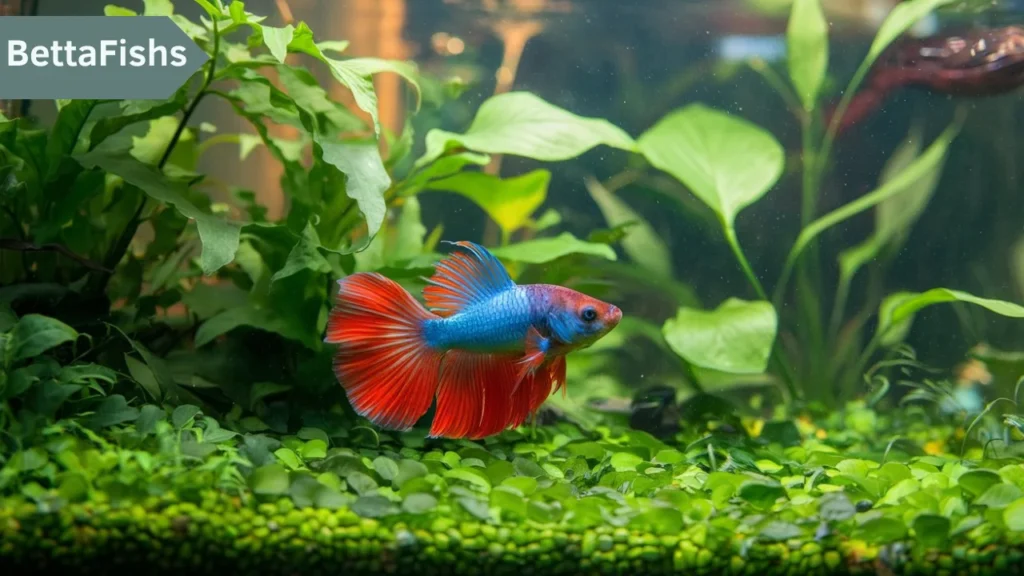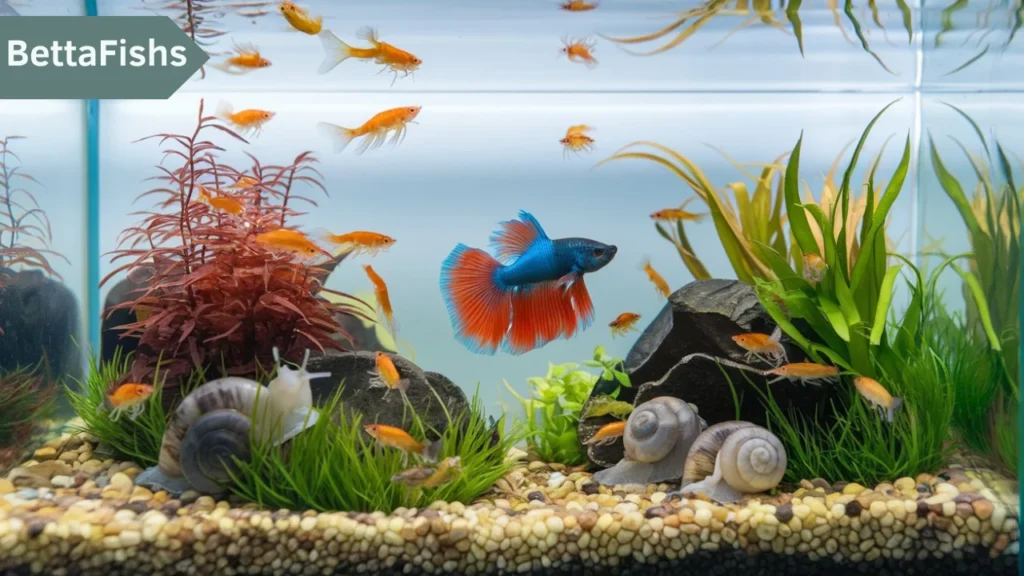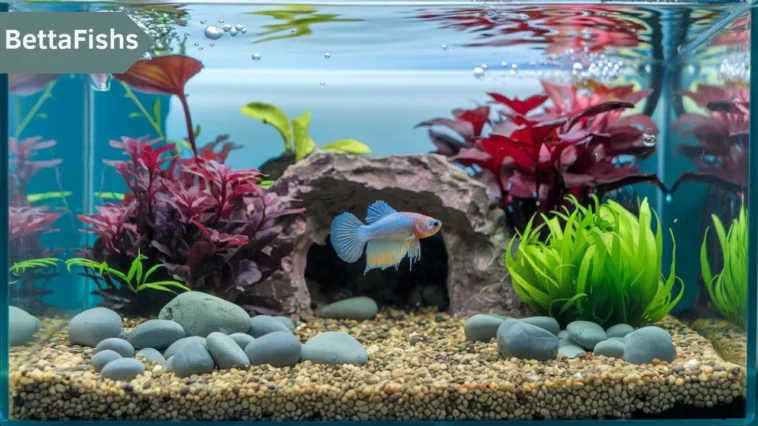One of the most common fish for home aquariums is the betta fish, sometimes referred to as Siamese fighting fish. Their vibrant colors and flowing fins make them attractive pets, but there’s a lot more to these fish than meets the eye. One question that many new betta owners ask is, ” Do betta fish get lonely? ” To find out if betta fish feel loneliness the same way humans do, we’ll examine their behavior, needs, and general well-being in this article.
Betta Fish Behavior
Before diving into the question of loneliness, it’s essential to understand the natural behavior of betta fish. In the wild, bettas are found in shallow waters, such as rice paddies, slow-moving streams, and ponds in Southeast Asia. These environments are typically dense with vegetation, providing plenty of hiding spots.
Natural Habitat and Lifestyle
Betta fish are naturally solitary creatures. In the wild, they are known for their territorial behavior, especially the males, who will fiercely guard their territory against intruders. This territorial nature is why bettas are often found alone, only coming into contact with others during mating or to defend their space.
Aggression and Territorial Nature
A significant characteristic of betta fish is their aggression, particularly among males. This aggression is not just a trait but a survival mechanism. In their natural habitat, competition for resources such as food and breeding grounds is high, so bettas have developed a combative nature to thrive.
Social Needs of Fish
The question of whether betta fish get lonely hinges on understanding what makes a fish social or solitary. Unlike social fish species that live in schools, bettas do not rely on others for safety or foraging. Their survival does not depend on a group dynamic.
What Makes Fish Social or Solitary?
Fish that are considered social often form schools to protect themselves from predators, increase their foraging efficiency, or reproduce. Betta fish, on the other hand, do not need the protection of a group due to their aggressive nature and do not benefit from schooling behavior.
The Science Behind Betta Fish and Loneliness
Loneliness is a human emotion that results from being isolated from others. Betta fish, having evolved as solitary creatures, do not have the same social structures as humans. While they do not experience loneliness as we do, they can become bored or stressed if their environment lacks stimulation.
Myth Busting: Do Betta Fish Feel Loneliness?
It’s important to differentiate between human emotions and fish behaviors. The concept of loneliness is tied to complex emotional states that fish do not experience in the same way humans do.
Differences Between Human and Fish Emotions
Human emotions are deeply tied to our social needs and relationships, whereas fish behaviors are more instinctual, driven by survival and reproduction. Thus, what we interpret as “loneliness” in fish is likely more about a lack of environmental enrichment rather than a need for companionship.
Can Betta Fish Get Depressed?
While bettas do not get lonely in the human sense, they can exhibit behaviors that might be seen as a form of depression. A betta in an unstimulating environment might become less active, show reduced interest in food, or display dull colors, indicating stress or boredom rather than depression.
How to Tell if Your Betta Fish is Stressed or Bored
The signs of stress or boredom in betta fish is key to ensuring their well-being.
Signs of Stress in Betta Fish
Common signs of stress include fin clamping, where the betta’s fins are held close to its body, hiding frequently, reduced activity, and loss of appetite. These behaviors may indicate that the fish is uncomfortable or unhappy in its current environment.
Identifying Boredom in Betta Fish
A bored betta might show a lack of curiosity, pacing back and forth in the tank, or floating listlessly. Unlike stress, boredom stems from a lack of stimulation rather than environmental discomfort.
The Ideal Living Environment for Betta Fish
Creating an ideal environment for betta fish involves more than just placing them in any fish tank. Factors such as tank size, water quality, and decoration play a critical role.
Tank Size and Setup
The idea that betta fish may live happily in little dishes is a frequent one. In reality, a tank of at least 5 gallons is recommended to provide enough space for exploration and exercise.
Water Quality and Maintenance
Clean, warm water is essential for betta health. Betta fish thrive in water temperatures between 76°F and 82°F, and regular water changes help prevent the buildup of harmful toxins.

Tank Companions: Can Betta Fish Live with Other Fish?
While bettas are solitary, they can sometimes cohabit with other fish under the right conditions.
Best Tank Mates for Betta Fish
If you’re considering adding tank mates, opt for calm, non-aggressive species that won’t compete for space or provoke the betta. Suitable tank mates include snails, shrimp, and some species of small, non-aggressive fish like the neon tetra.
Fish to Avoid Keeping with Betta Fish
Avoid other bettas, aggressive fish, or fish with long, flowing fins, as these can trigger the betta’s territorial aggression.
Alternative Ways to Keep Your Betta Fish Engaged
Keeping a betta fish engaged is about more than just having tank mates. Enrichment can also come from other sources.
Aquarium Enrichment Ideas
Add plants, caves, and floating logs to create an interactive environment. This setup provides hiding spots and stimulates exploration, helping reduce boredom and stress.
Feeding Strategies for Mental Stimulation
Introduce variety into their diet with different types of high-quality betta pellets, and frozen or live foods like bloodworms and brine shrimp, which can stimulate natural hunting behaviors.
Common Mistakes in Betta Fish Care
Many new owners unknowingly make mistakes that can affect their betta’s health and happiness.
Overcrowding and Its Effects
Overcrowding can lead to increased stress and aggression, as bettas may feel their territory is threatened. Ensure your betta has enough space to thrive.
Neglecting Regular Tank Maintenance
Dirty water can lead to health issues, so it’s crucial to maintain a clean tank with regular water changes and filter cleaning.
How to Improve Your Betta Fish’s Well-being
Focusing on consistent care practices can significantly impact your betta’s quality of life.
Routine Care Tips
Regular water changes, maintaining the correct water temperature, and providing a varied diet can help keep your betta healthy and happy.
Importance of Consistent Feeding and Cleaning
Establishing a routine helps bettas feel secure in their environment, reducing stress and promoting overall well-being.
Expert Opinions on Betta Fish Loneliness
What do experts have to say about betta fish and loneliness?
What Do Marine Biologists Say?
Many marine biologists suggest that betta fish do not get lonely but require a stimulating environment to thrive. Their behavior is more about territory and environment than social interaction.
Perspectives from Betta Fish Enthusiasts
Betta enthusiasts often emphasize the importance of enrichment and proper care rather than worrying about loneliness, advocating for larger tanks and more interactive environments.
Betta Fish and Human Interaction
While bettas are solitary, they can interact with humans in interesting ways.

Do Betta Fish Recognize Their Owners?
Some bettas may learn to recognize their owners and respond to their presence, often associating them with feeding time. This recognition can add another layer of engagement for the fish.
How to Safely Interact with Your Betta Fish
You can interact with your betta by gently waving your finger near the tank or using a mirror for short periods to stimulate their natural display behaviors but be cautious not to stress them out.
Addressing Common Betta Fish Health Issues
Like all pets, betta fish can suffer from various health problems.
Fin Rot, Ich, and Other Diseases
Conditions like fin rot and ich are common in bettas but can often be prevented with proper care, including regular water changes and avoiding overcrowded tanks.
Preventative Measures and Treatments
Treating diseases early with appropriate medications and maintaining clean water conditions are crucial for keeping bettas healthy.
Conclusion
In conclusion, betta fish do not get lonely in the same way humans do, but they do require a well-maintained, stimulating environment to stay healthy and happy. By understanding their unique needs and behaviors, you can ensure your betta leads a fulfilling life.
FAQs
Can You Have More Than One Betta Fish in a Tank?
It’s generally not recommended to keep more than one male betta in the same tank due to their aggressive nature. However, some female bettas can live together in a group called a sorority.
How Can You Tell if a Betta Fish is Happy?
A happy betta will display vibrant colors, actively swim around the tank, and show curiosity about their surroundings.
What is the Lifespan of a Betta Fish?
Betta fish can live for 3 to 5 years with proper care, including a clean tank and a healthy diet.
How Often Should You Feed a Betta Fish?
Bettas should be fed once or twice a day with a varied diet of high-quality pellets and occasional treats like frozen or live food.
Do Betta Fish Need Light in Their Tank?
Betta fish benefit from a regular light cycle, mimicking natural day and night. However, avoid direct sunlight as it can cause rapid temperature changes and algae growth.




